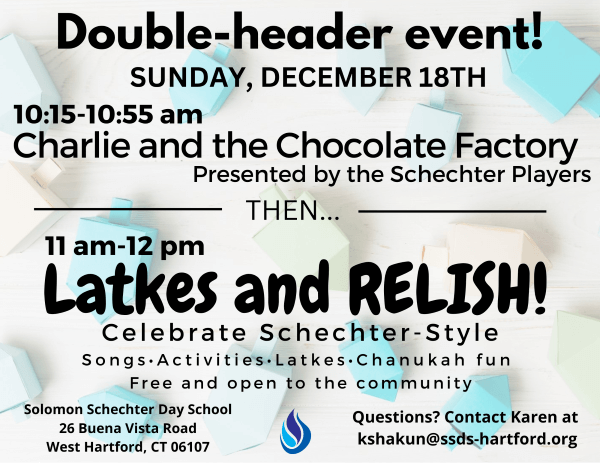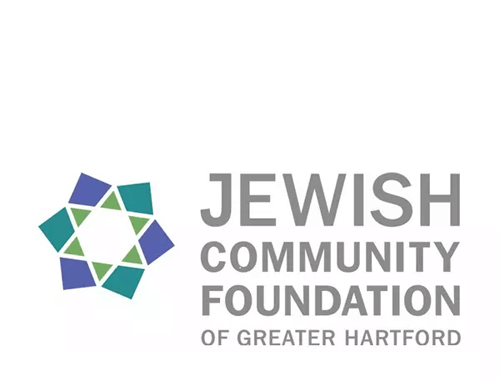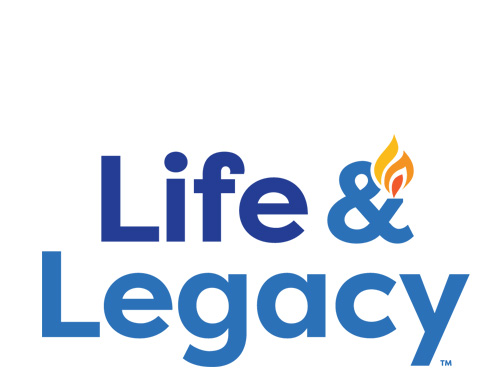Schechter Shavua: December 9, 2022
Exploring the Wide Array of Middle School Electives
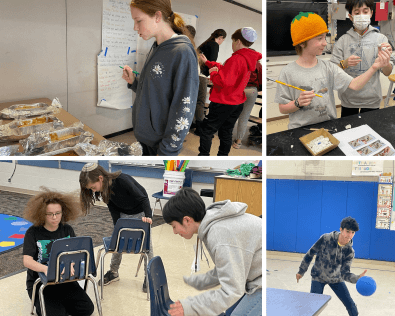 Which would you choose…. Science of Cooking? STOMP!? Olympic Games? Sculpture? There are so many options for Schechter’s Middle School Electives! Students in grades 6-8 have more choice and autonomy in their schedules this fall, thanks to the introduction of Middle School Electives. Each student selects the Unified Arts class that interests them most. In January, faculty members will introduce even more options to choose from and additional sessions for the entire Middle School of grades 5-8.
Which would you choose…. Science of Cooking? STOMP!? Olympic Games? Sculpture? There are so many options for Schechter’s Middle School Electives! Students in grades 6-8 have more choice and autonomy in their schedules this fall, thanks to the introduction of Middle School Electives. Each student selects the Unified Arts class that interests them most. In January, faculty members will introduce even more options to choose from and additional sessions for the entire Middle School of grades 5-8.
The "STOMP!" elective held by Ms. Rose, Schechter’s enthusiastic music teacher, began by discussing the mission statement of the show STOMP! - to create joyful, funny, storytelling musical performances using ordinary objects. Then, students got down to the serious (and also hilarious!) business of creating their own versions. Students were offered classroom objects like markers, chairs, clipboards and paper...and the results were extraordinary! They improvised fantastic performances that told a clear story depicting an aspect of being in the classroom, from gaining bad grades to driving the teacher crazy! Each week holds a different theme for these imaginative students to stretch their creative muscles.
Science of Cooking isn’t just your average cooking class. For the first two sessions, Director of Teaching and Learning Sarah Montag exposed our bakers to the science of raising agents (yeast, baking soda, baking powder, and cream of tartar). Each group was assigned either one raising agent or a control group (aka no raising agent) and baked identical recipes using their agent. Students researched the properties and effects of their agent and presented their findings to the class. Later, the fun part: judging each of the five loaves according to height, appearance, and, of course, taste. You might be surprised to see the final averages - out of five possible points - for each of the raising agents, according to the student rankings:
- Baking Powder (4.38)
- Baking Soda (3.85)
- Nothing (3.45)
- Cream of Tartar (2.08)
- Yeast (1.36)
For the latter two cooking sessions, Head of School Rabbi Yoni Berger rolled up his sleeves and taught students about two other scientific properties related to cooking: egg proteins and gluten. In one class, students learned on a molecular level what happens to eggs when you cook them (ask your middle school chef about the fun pipe cleaner demonstration they used to grasp the concept!). Students made either sunny-side up or scrambled eggs, then tested their understanding of these molecular properties by deliberately over-cooking a small batch of eggs to see the difference. On a different morning, students learned about the properties of gluten and then made their own homemade pasta and tomato sauce. One group prepared tomato sauce, complete with onions and garlic, while the other groups rolled and shaped their pasta dough in their favorite form (straight, thin, wide, connected, and lasagne-style) before boiling and eating the noodles. They observed that homemade pasta tastes very different from that from a box!
The Olympic Games Elective is a fun way for students to test their physical fitness while learning and participating in some of the fun sports that occur in the Summer Olympics. Some of the competitions were more familiar to these active kids, while others - like modified table tennis - taught them new sets of skills and rules. In each event, students learned the rules and proper techniques, emphasizing a competitive spirit while also encouraging each other with more challenging events. Events included: Discus Throwing, Shot Put, Long Jump, High Jump (Pole Vaulting w/o the pole), Hurdles, Long Distance Running (choice of 3000 m or 5K), Sprints (100 m Run), and Modified Table Tennis.
In the Art Elective, Middle School students have been creating dragon eye sculptures out of clay. First they painted the eye and glued a glass bead onto the paint. They filled in their three-dimensional frame with smaller eye shapes. Then the really fun part: making the scales and spikes. When they finish sculpting, students will paint their dragons. They are very excited to see the finished sculptures!
Check out photos of these fantastic electives HERE!
Alim Students Get their Hands Dirty in Science
As part of their Animal Science unit, the Alim students (grades 3-4) have been learning about animal structures that are used for support, movement, and protection in science. Recently, students explored this with a truly hands-on activity. Small groups of students were given pill bug habitats. They used magnifying glasses to get a closer look at the pill bugs, then touched them with their fingers (if they wished) and watched them crawl around. The students noticed that pill bugs roll into a ball to protect themselves when they are scared and have many tiny legs to help them move fast. They also noticed that pill bugs have a hard outer layer to also protect them.
Click HERE to see photos! And WATCH A VIDEO HERE of Jake describing his observations!
Earth Science Lights a Fire Under Middle School Students
In Middle School science, students are studying the Earth in a wide variety of ways. You can track the ways that related scientific content becomes more specific and challenging as our students get older.
In 5th grade, students have been learning about Earth's systems - the geosphere, biosphere, hydrosphere, and atmosphere. That includes learning about weather, climate, erosion, and how humans affect the different spheres through things like farming and industry. Their big takeaway is how Earth's systems interact with each other and what role we play in them.
As 6th and 7th graders continue their study of Earth Science, students explored the way that rocks (and ultimately landforms) are shaped through weathering. In the science lab, students rocked tubes back and forth to simulate mechanical weathering of chalk and plaster rocks. They opened the tubes to observe the changes every four minutes. Students noticed that their rocks became smaller and smoother and a lot of smaller particles were generated. They observed how the shapes of the rocks changed in four minute intervals. Students determined that mechanical weathering loosens sediment, allowing it to be eroded and deposited.
Finally, 8th graders have been studying plate tectonics and how the Earth is changing by simulating the formation of volcanoes. Starting with a layer of wax filling the bottom of a beaker, each group of students then filled their beakers with a layer of sand and water. Students heated their beakers on a hot plate and observed the changes. As the beakers heated up, the layer of wax began to melt; it burst through the layer of sand, rose through the water, and pooled on the surface of the beakers. Using their understanding of plate tectonics, students related each of the layers in the beaker to different densities of rock in the Earth. Students also used their understanding of convection to explain why the hot wax rose through the sand and water to the surface of the beaker. Whenever students have such hands-on experiments like this, they practice lab safety while carrying out the procedures, setting them up for tremendous success in high school science classes.
Click HERE to see photos of Middle School science!
Parashat Vayishlah — What was Esav really after?
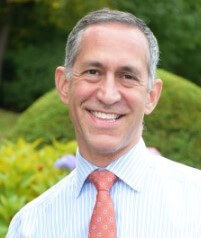 Sometimes, our enemies are real; it’s important to acknowledge that. As individuals, as a community, as a country, and as a people, we have to be on guard against real hatred. Sometimes, though, we misread the feelings and intentions of the Other, imagining them to be full of hatred, when in truth, something else is going on. A compelling example can be found in this week’s Torah reading, Vayishlah.
Sometimes, our enemies are real; it’s important to acknowledge that. As individuals, as a community, as a country, and as a people, we have to be on guard against real hatred. Sometimes, though, we misread the feelings and intentions of the Other, imagining them to be full of hatred, when in truth, something else is going on. A compelling example can be found in this week’s Torah reading, Vayishlah.
The first two chapters of the parashahdescribe the elaborate, awkward reunion of Jacob (Ya’akov) and Esau (Esav). Jacob sends a series of expensive gifts to his brother: messenger follows messenger, each bringing goats, ewes, rams and more. When Amazon sends us five staggered deliveries on the same day, we may wonder why they weren’t bundled for greater efficiency. In this case, though, efficiency wasn’t the goal; Jacob was trying to overwhelm his brother with gifts. He knows his brother is mad at him, and fears that just as an extinguished fire can flare back up because the heat may remain after the flame is gone, his brother’s anger may flare up after a gift briefly soothes it. By having the gifts arrive in a series, Jacob hopes to put out the fire for good.
And on the face of it, Jacob is successful: when they meet, not only does Esau embrace him, but he also offers to journey onward with Jacob. When Jacob demurs, Esau offers to send armed men to protect Jacob’s family. The gifts seem to have succeeded in calming Esau down.
This reading of the story coheres with the ancient rabbis’ belief that Esau was like an animal, all brute force and raw emotions, soothed by treats. But there are many hints that this is an unfair way to understand Jacob’s brother. Throughout the stories, we see Esau’s pain after losing his father’s best blessing, his attempt to win his mother’s love by marrying women he thought she’d approve of, and—in this story—his initial refusal to accept any of Jacob’s gifts. He really doesn’t seem to be out for blood, and he isn’t after money, even though he would have been justified in seeking it. All he really wanted was love and respect! Sadly, it may have been easier for Jacob to send livestock than it was for him to demonstrate love. In the end, though, I believe that Jacob saw that he had misjudged his brother. Towards the end of the parashah, the brothers reunite again to bury their father. May their slow but real path towards a relationship light the way for us.
Shabbat shalom,
Rabbi Jonathan Berger
Head of School
Questions for the Shabbat table:
1. What role do you think Jacob’s feelings of guilt played in his assumption that his brother wanted to kill him?
2. Have you ever assumed the worst about someone else’s feelings towards you, only to realize that they just wanted respect?
Solomon Schechter Day School
of Greater Hartford
26 Buena Vista Road
West Hartford, CT 06107
© Solomon Schechter Day School of Greater Hartford | Site design Knowles Kreative
